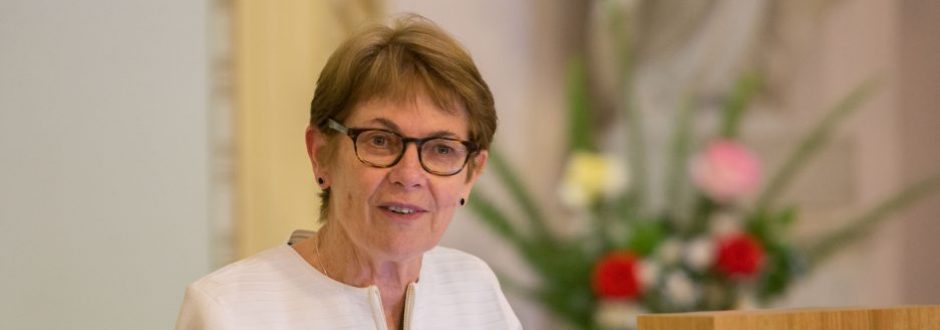I am proud to name myself as a feminist. Yet, I part ways with the greater majority of feminists on the issue of abortion, writes Congregational Leader Patty Fawkner SGS.
I am not in favour of abortion, particularly when used as a form of contraception and gender selection. Neither am I in favour of using abortion as the sole litmus test of Catholic orthodoxy or moral rectitude. If we are pro-life, which I presume we all are, then we need to be pro-life on all social and moral issues.
Cardinal Joseph Bernardin of Chicago became an ardent advocate for a “consistent ethic of life” back in the early 80s.
“The spectrum of life cuts across the issues of genetics, abortion, capital punishment, modern warfare and the care of the terminally ill,” Bernardin said.
Anyone concerned for the sacredness of life of the unborn or those on death row should be concerned about the sacredness of all life. To Bernardin’s list, we could add issues such as racism, gender violence, sharing COVID-19 vaccines with poorer nations, extinction of species and care for our common home. “When human life is considered ‘cheap’ or easily expendable in one area,” Bernardin proclaimed, “eventually nothing is held as sacred and all lives are in jeopardy.”
While I might advocate on a particular issue in my circle of influence, I need to be “catholic” in my circle of concern, or as Cardinal Ratzinger (the future Pope Benedict XVI) said: “The Christian faith is an integral unity, and thus it is incoherent to isolate some particular element to the detriment of the whole of Catholic doctrine.” This is a challenge to conservative Catholics who may be anti-abortion and pro-capital punishment, and equally for so-called ‘progressives’ who may be pro-abortion and anti-capital punishment.
We saw an ethic of life on display with full-blown inconsistency during the presidency of Donald Trump.
Trump (expediently?) changed his pro-choice stance to pro-life prior to running for president. The list of his anti-life actions during his four-year term is extensive: the forced separation of babies and children from their parents who illegally crossed the US-Mexico border, his barely concealed racism, the inciting of white supremacists to violence, and his rush to execute criminals on death row following his election defeat last year, making him “the country’s most prolific execution president in more than a century” (BBC News).
These actions are disturbing in and of themselves, and what is also disturbing is the significant support Trump received from American Catholics, both in the 2016 and 2020 elections. It is estimated that 50% of Catholics voted for Trump because of his views on abortion. Abortion was the litmus test for their vote.
It also seems that for an increasing number of the faithful, abortion becomes the litmus test for who is ‘worthy’ to receive the Eucharist.
There is a strong push in the US, led by Archbishop José H Gomez, President of the US Conference of Catholic Bishops, and a number of bishops, to exclude President Joe Biden from the Eucharist because of his views on abortion.
Archbishop Gomez flagged his concerns when “congratulating” Biden on his inauguration. “I must point out that our new President has pledged to pursue certain policies that would advance moral evils and threaten human life and dignity, most seriously in the areas of abortion, contraception, marriage, and gender.”
The American bishops are gathering for their 2021 spring general assembly from June 16-18. Their original plan was to draft a policy on the worthiness of pro-choice politicians to receive Communion. That is until the Vatican, in effect, ‘torpedoed’ those plans.
The ‘missile’ came in the form of a letter written by Cardinal Luis Ladaria, the Prefect of the Congregation for the Doctrine of the Faith, to Archbishop Gomez as head of the bishops conference. Ladaria writes: “It would be misleading if such a statement were to give the impression that abortion and euthanasia alone constitute the only grave matters of moral and social teaching that demand the fullest level of accountability on the part of Catholics.”
In plain speak, throughout his letter, Ladaria is strongly advising/warning/admonishing the bishops neither to weaponise nor politicise the Eucharist.
If President Biden is judged to be unworthy of the Eucharist, then it begs the question as to how many of us are worthy. I take comfort in knowing that God will be the ultimate judge of my worthiness, and also in Pope Francis’ famous words in his first Encyclical Evangelii Gaudium, that “The Eucharist … is not a prize for the perfect but a powerful medicine and nourishment for the weak.” (EG #47)
It occurs to me that it is better to promote the ‘carrot’ of Christ’s all-embracing, merciful love rather than the ‘stick’ of sacramental exclusion and judgment of unworthiness.
And how do we extend Christ’s all-embracing, merciful love to the estimated 70,000 of the world’s poorest women who die every year as a result of illegal abortion? (WHO, Journal Paper, Sexual and Reproductive Health 4)
I look forward to a world where abortion is not necessary, where women feel safe and secure, and have the support and resources to choose life rather than abortion. This may sound utopian, yet it is a reality worth fighting for by all pro-choice and pro-life advocates.
